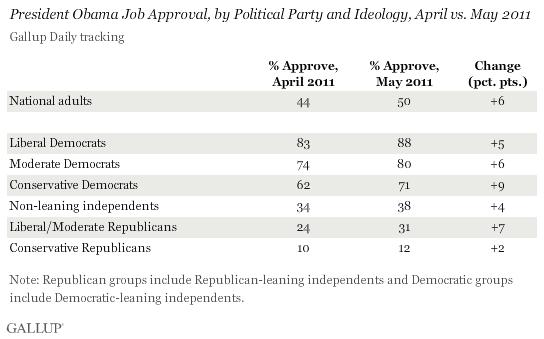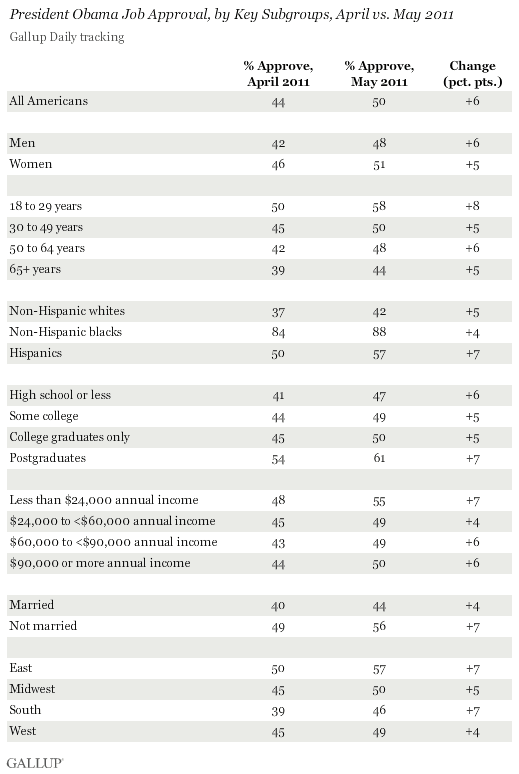PRINCETON, NJ -- All political subgroups were more approving of President Obama in May than they were in April. The recent rally includes a four-percentage-point increase in his job approval rating among Republicans, driven more by liberal and moderate Republicans than by conservative Republicans. Conservative Democrats' nine-point boost is the largest among party and ideological groups.

Overall, Obama averaged 50% approval in Gallup Daily tracking in May, largely as a result of the rally in support for him after U.S. military forces killed Osama bin Laden in a May 1 military raid. That marked a significant improvement from April, when Obama averaged 44% approval, tied with August 2010 for his lowest monthly approval average as president.
All key demographic subgroups expressed higher approval in May than in April, and most of these increases were within a couple of points of the national average of six points.
Across the major U.S. demographic and political subgroups, blacks, moderate Democrats, and liberal Democrats remain the most supportive of Obama, with approval ratings of at least 80%. Only two other groups analyzed here -- conservative Democrats and postgraduates -- give Obama ratings above 60%.
The recent rally has put Obama back above majority approval among women, young adults, Hispanics, those with lower incomes, those who are not married, and Eastern residents.

Implications
Although Americans of all political groups overwhelmingly approved of the U.S. military action that resulted in bin Laden's death, and Americans overall have viewed the president more positively since then, the event moved conservative Republicans much less than other Americans to see Obama in a better light. The group's approval rating did increase after the bin Laden killing, but by a minimal two points compared with the six-point national average. Conservative Republicans have traditionally been the group least supportive of President Obama.
Thus, it appears there is little Obama can reasonably do that would dramatically increase his support among conservative Republicans. That is one reason Obama's approval ratings have been among the most polarized of recent U.S. presidents.
Survey Methods
Results are based on telephone interviews conducted as part of Gallup Daily tracking May 1-31, 2011, with a random sample of 15,451 adults, aged 18 and older, living in all 50 U.S. states and the District of Columbia.
For results based on the total sample of national adults, one can say with 95% confidence that the maximum margin of sampling error is ±1 percentage point.
For results based on the total sample of 4,630 conservative Republicans and Republican-leaners, one can say with 95% confidence that the maximum margin of sampling error is ±2 percentage points.
Interviews are conducted with respondents on landline telephones and cellular phones, with interviews conducted in Spanish for respondents who are primarily Spanish-speaking. Each sample includes a minimum quota of 400 cell phone respondents and 600 landline respondents per 1,000 national adults, with additional minimum quotas among landline respondents for gender within region. Landline telephone numbers are chosen at random among listed telephone numbers. Cell phone numbers are selected using random-digit-dial methods. Landline respondents are chosen at random within each household on the basis of which member had the most recent birthday.
Samples are weighted by gender, age, race, Hispanic ethnicity, education, region, adults in the household, and phone status (cell phone only/landline only/both, cell phone mostly, and having an unlisted landline number). Demographic weighting targets are based on the March 2010 Current Population Survey figures for the aged 18 and older non-institutionalized population living in U.S. telephone households. All reported margins of sampling error include the computed design effects for weighting and sample design.
In addition to sampling error, question wording and practical difficulties in conducting surveys can introduce error or bias into the findings of public opinion polls.
For more details on Gallup's polling methodology, visit www.gallup.com.
